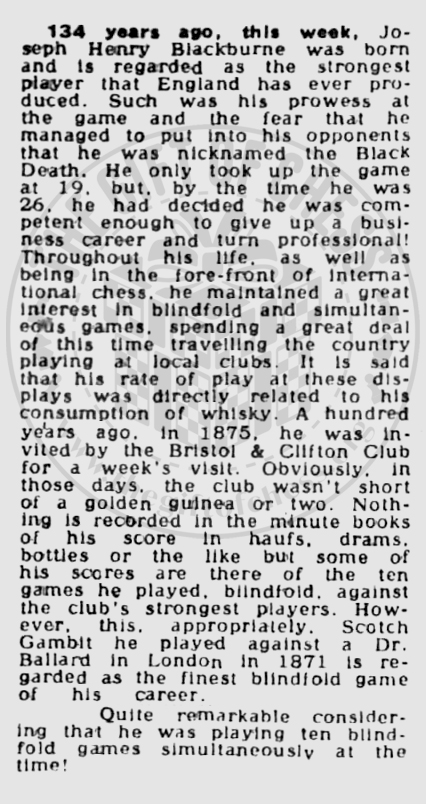September 04 1975
Fitchburg Sentinel, Fitchburg, Massachusetts, Thursday, September 04, 1975
Three WCC Members Capture Round Robin
Leominster—The Blackburne Memorial, a multi-sectional round robin chess tournament held last week at Ronnies Cafe, ended in victory for three members of the Wachusett Chess Club of the Fitchburg YMCA.
Stephan Gerzadowicz of East Templeton, playing in a section with a master and two nationally-rated class A players, tied for first with former state champion John Curdo of Lawrence with a score of 2½-½. Gerzadowicz, however, went on to beat the master in a 5-minute playoff game and was declared winner of the section.
George Mirijanian of Fitchburg, playing in two sections simultaneously, finished first in both with perfect scores of 3-0. Richard McMaster, also of Fitchburg, emerged victorious in his section, which was conducted as a six-player three-round Swiss system event.
The tournament was held in honor of Joseph Henry Blackburne (1841-1924), one of the strongest players England has ever produced. Blackburne learned to play chess when he was 19 and by the time he was 26 had decided to give up his business career and become a chess professional.
Blackburn brought something new and breezy to English chess. It was customary in his day for a player giving a simultaneous exhibition to appear at such a display faultlessly dressed, wearing a top hat and morning clothes. In addition, the display was conducted with great solemnity. Blackburne broke with this convention and turned up wearing old clothes and mowed down the opposition to an accompaniment of banter and badinage. However, the most remarkable aspect of Blackburne's chess playing was his unrivalled capacity for alcohol, which modern masters would never dare indulge in during the course of play without seriously impairing their playing ability. Blackburne, on the other hand, never made a secret of his passion for drinking and in an interview given at the turn of the century he complacently said: “I find that whisky is a most useful stimulus to mental activity, especially when one is engaged in a stiff and prolonged struggle. All chess players indulge moderately in wines or spirits. Speaking for myself, alcohol clears the brain and I always have a glass or two when playing.”
It was not entirely by coincidence that this interview appeared in the publication Licensing World, and one can only hope that as a result of it Blackburne received a lifetime pass to every pub in England. The statement created a storm. The Temperance League was up in arms. Some of Blackburne's colleagues tuttutted and much was made of it.
Because Blackburne's liking for whiskey was well-known, some players took advantage of it. On one occasion, when Blackburne was visiting Cambridge University to give a simultaneous exhibition, in order to speed up the proceedings, the undergraduates hit upon the scheme of leaving a bottle of whiskey and a glass at each end of the room. The plan worked and Blackburne finished the display in record time.
December 12 1975
Western Daily Press, Bristol, Avon, England, Friday, December 12, 1975
134 years ago, this week, Joseph Henry Blackburne was born and is regarded as the strongest player that England has ever produced. Such was his prowess at the game and the fear that he managed to put into his opponents that he was nicknamed the Black Death. He only took up the game at 19, but by the time he was 26, he had decided he was competent enough to give up a business career and turn professional! Throughout his life, as well as being in the fore-front of international chess, he maintained a great interest in blindfold and simultaneous games spending a great deal of this time traveling the country playing at local clubs. It is said that his rate of play at these displays was directly related to his consumption of whisky. A hundred years ago, in 1875, he was invited by the Bristol & Clifton Club for a week's visit. Obviously, in those days the club wasn't short of a golden guinea or two. Nothing is recorded in the minute books of his score in haufs, drams, bottles or the like but some of his scores are there of the ten games he played blindfold against the club's strongest players. However this appropriately Scotch Gambit he played against a Dr. Ballard in London in 1871 is regarded as the finest blindfold game of his career.
Joseph Henry Blackburne vs William Ballard
Blindfold simul, 10b (1872) (blindfold), London ENG, Mar-20
Scotch Game: Scotch Gambit. Saratt Variation (C44) 1-0
Quite remarkable considering that he was playing ten blindfold games simultaneously at the time!
























